2003 吉林考研英语一真题及答案
Section II
Directions:
Use of English
Read the following text. Choose the best word (s) for each numbered blank and mark
[A], [B], [C] or [D] on ANSWER SHEET 1. (10 points)
Teachers need to be aware of the emotional, intellectual, and physical changes that
young adults experience. And they also need to give serious ___21___ to how they
can best ___22___ such changes. Growing bodies need movement and ___23___, but not
just in ways that emphasize competition. ___24___ they are adjusting to their new
bodies and a whole host of new intellectual and emotional challenges, teenagers are
especially self-conscious and need the ___25___ that comes from achieving success
and knowing that their accomplishments are ___26___ by others. However, the typical
teenage lifestyle is already filled with so much competition that it would be
___27___ to plan activities in which there are more winners than losers, ___28___,
publishing newsletters with many student-written book reviews, ___29___ student
artwork, and sponsoring book discussion clubs. A variety of small clubs can provide
___30___ opportunities for leadership, as well as for practice in successful
___31___ dynamics. Making friends is extremely important to teenagers, and many shy
students need the ___32___ of some kind of organization with a supportive adult
___33___ visible in the background.
In these activities, it is important to remember that the young teens have ___34___
attention spans. A variety of activities should be organized ___35___ participants
can remain active as long as they want and then go on to ___36___ else without feeling
guilty and without letting the other participants ___37___. This does not mean that
adults must accept irresponsibility. ___38___, they can help students acquire a
sense of commitment by ___39___ for roles that are within their ___40___ and their
attention spans and by having clearly stated rules.
21.
[A] thought
[B] idea
[C] opinion
[D] advice
22.
[A] strengthen
[B] accommodate
�
[C] stimulate
[D] enhance
23.
[A] care
[B] nutrition
[C] exercise
[D] leisure
24.
[A] If
[B] Although
[C] Whereas
[D] Because
25.
[A] assistance
[B] guidance
[C] confidence
[D] tolerance
26.
[A] claimed
[B] admired
[C] ignored
[D] surpassed
27.
[A] improper
[B] risky
[C] fair
[D] wise
�
28.
[A] in effect
[B] as a result
[C] for example
[D] in a sense
29.
[A] displaying
[B] describing
[C] creating
[D] exchanging
30.
[A] durable
[B] excessive
[C] surplus
[D] multiple
31.
[A] group
[B] individual
[C] personnel
[D] corporation
32.
[A] consent
[B] insurance
[C] admission
[D] security
33.
[A] particularly
[B] barely
�
[C] definitely
[D] rarely
34.
[A] similar
[B] long
[C] different
[D] short
35.
[A] if only
[B] now that
[C] so that
[D] even if
36.
[A] everything
[B] anything
[C] nothing
[D] something
37.
[A] off
[B] down
[C] out
[D] alone
38.
[A] On the contrary
[B] On the average
[C] On the whole
[D] On the other hand
�
39.
[A] making
[B] standing
[C] planning
[D] taking
40.
[A] capabilities
[B] responsibilities
[C] proficiency
[D] efficiency
Section III Reading Comprehension
Part A
Directions:
Read the following four texts. Answer the questions below each text by choosing [A],
[B], [C] or [D]. Mark your answers on ANSWER SHEET 1 (40 points)
Text 1
Wild Bill Donovan would have loved the Internet. The American spymaster who built
the Office of Strategic Services in the World War II and later laid the roots for
the CIA was fascinated with information. Donovan believed in using whatever tools
came to hand in the “great game” of espionage -- spying as a “profession.” These
days the Net, which has already re-made such everyday pastimes as buying books and
sending mail, is reshaping Donovan’s vocation as well.
The latest revolution isn’t simply a matter of gentlemen reading other gentlemen’
s e-mail. That kind of electronic spying has been going on for decades. In the past
three or four years, the World Wide Web has given birth to a whole industry of
point-and-click spying. The spooks call it “open-source intelligence,” and as the
Net grows, it is becoming increasingly influential. In 1995 the CIA held a contest
to see who could compile the most data about Burundi. The winner, by a large margin,
was a tiny Virginia company called Open Source Solutions, whose clear advantage was
its mastery of the electronic world.
Among the firms making the biggest splash in this new world is Straitford, Inc.,
a private intelligence-analysis firm based in Austin, Texas. Straitford makes money
by selling the results of spying (covering nations from Chile to Russia) to
�
corporations like energy-services firm McDermott International. Many of its
predictions are available online at www.straitford.com.
Straitford president George Friedman says he sees the online world as a kind of
mutually reinforcing tool for both information collection and distribution, a
spymaster’s dream. Last week his firm was busy vacuuming up data bits from the far
corners of the world and predicting a crisis in Ukraine. “As soon as that report
runs, we’ll suddenly get 500 new Internet sign-ups from Ukraine,” says Friedman,
a former political science professor. “And we’ll hear back from some of them.”
Open-source spying does have its risks, of course, since it can be difficult to tell
good information from bad. That’s where Straitford earns its keep.
Friedman relies on a lean staff of 20 in Austin. Several of his staff members have
military-intelligence backgrounds. He sees the firm’s outsider status as the key
to its s
uccess. Straitford’s briefs don’t sound like the usual Washington back-and-forthing,
whereby agencies avoid dramatic declarations on the chance they might be wrong.
Straitford, says Friedman, takes pride in its independent voice.
41.
The emergence of the Net has ________________________.
[A] received support from fans like Donovan
[B] remolded the intelligence services
[C] restored many common pastimes
[D] revived spying as a profession
42.
Donovan’s story is mentioned in the text to ________________________.
[A] introduce the topic of online spying
[B] show how he fought for the U.S.
[C] give an episode of the information war
[D] honor his unique services to the CIA
The phrase “making the biggest splash” (Line 1, Paragraph 3) most probably
43.
means ________________________.
[A] causing the biggest trouble
�
[B] exerting the greatest effort
[C] achieving the greatest success
[D] enjoying the widest popularity
44.
It can be learned from Paragraph 4 that ________________________.
[A] Straitford’s prediction about Ukraine has proved true
[B] Straitford guarantees the truthfulness of its information
[C] Straitford’s business is characterized by unpredictability
[D] Straitford is able to provide fairly reliable information
45.
Straitford is most proud of its ________________________.
[A] official status
[B] nonconformist image
[C] efficient staff
[D] military background
Text 2
To paraphrase 18th-century statesman Edmund Burke, “all that is needed for the
triumph of a misguided cause is that good people do nothing.” One such cause now
seeks to end biomedical research because of the theory that animals have rights
ruling out their use in research. Scientists need to respond forcefully to animal
rights advocates, whose arguments are confusing the public and thereby threatening
advances in health knowledge and care. Leaders of the animal rights movement target
biomedical research because it depends on public funding, and few people understand
the process of health care research. Hearing allegations of cruelty to animals in
research settings, many are perplexed that anyone would deliberately harm an animal.
For example, a grandmotherly woman staffing an animal rights booth at a recent street
fair was distributing a brochure that encouraged readers not to use anything that
comes from or is tested in animals—no meat, no fur, no medicines. Asked if she
opposed immunizations, she wanted to know if vaccines come from animal research.
When assured that they do, she replied, “Then I would have to say yes.” Asked what
will happen when epidemics return, she said, “Don’t worry, scientists will find
some way of using computers.” Such well-meaning people just don’t understand.
�
Scientists must communicate their message to the public in a compassionate,
understandable way -- in human terms, not in the language of molecular biology. We
need to make clear the connection between animal research and a grandmother’s hip
replacement, a father’s bypass operation, a baby’s vaccinations, and even a pet’
s shots. To those who are unaware that animal research was needed to produce these
treatments, as well as new treatments and vaccines, animal research seems wasteful
at best and cruel at worst.
Much can be done. Scientists could “adopt” middle school classes and present their
own research. They should be quick to respond to letters to the editor, lest animal
rights misinformation go unchallenged and acquire a deceptive appearance of truth.
Research institutions could be opened to tours, to show that laboratory animals
receive humane care. Finally, because the ultimate stakeholders are patients, the
health research community should actively recruit to its cause not only well-known
personalities such as Stephen Cooper, who has made courageous statements about the
value of animal research, but all who receive medical treatment. If good people do
nothing, there is a real possibility that an uninformed citizenry will extinguish
the precious embers of medical progress.
The
46.
________________________.
author
begins
his
article
with
Edmund
Burke ’ s
words
to
[A] call on scientists to take some actions
[B] criticize the misguided cause of animal rights
[C] warn of the doom of biomedical research
[D] show the triumph of the animal rights movement
Misled people tend to think that using an animal in research is
47.
________________________.
[A] cruel but natural
[B] inhuman and unacceptable
[C] inevitable but vicious
[D] pointless and wasteful
The example of the grandmotherly woman is used to show the public ’ s
48.
________________________.
�
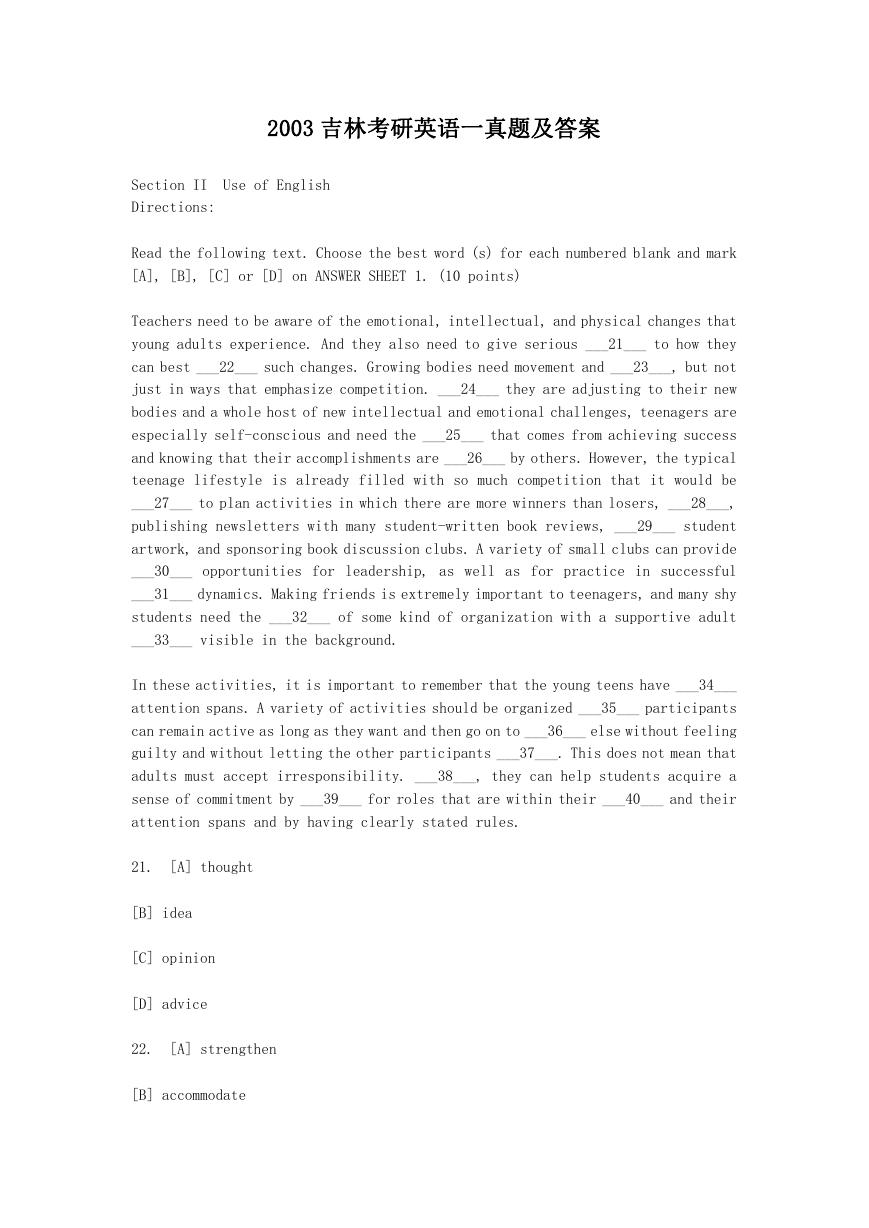
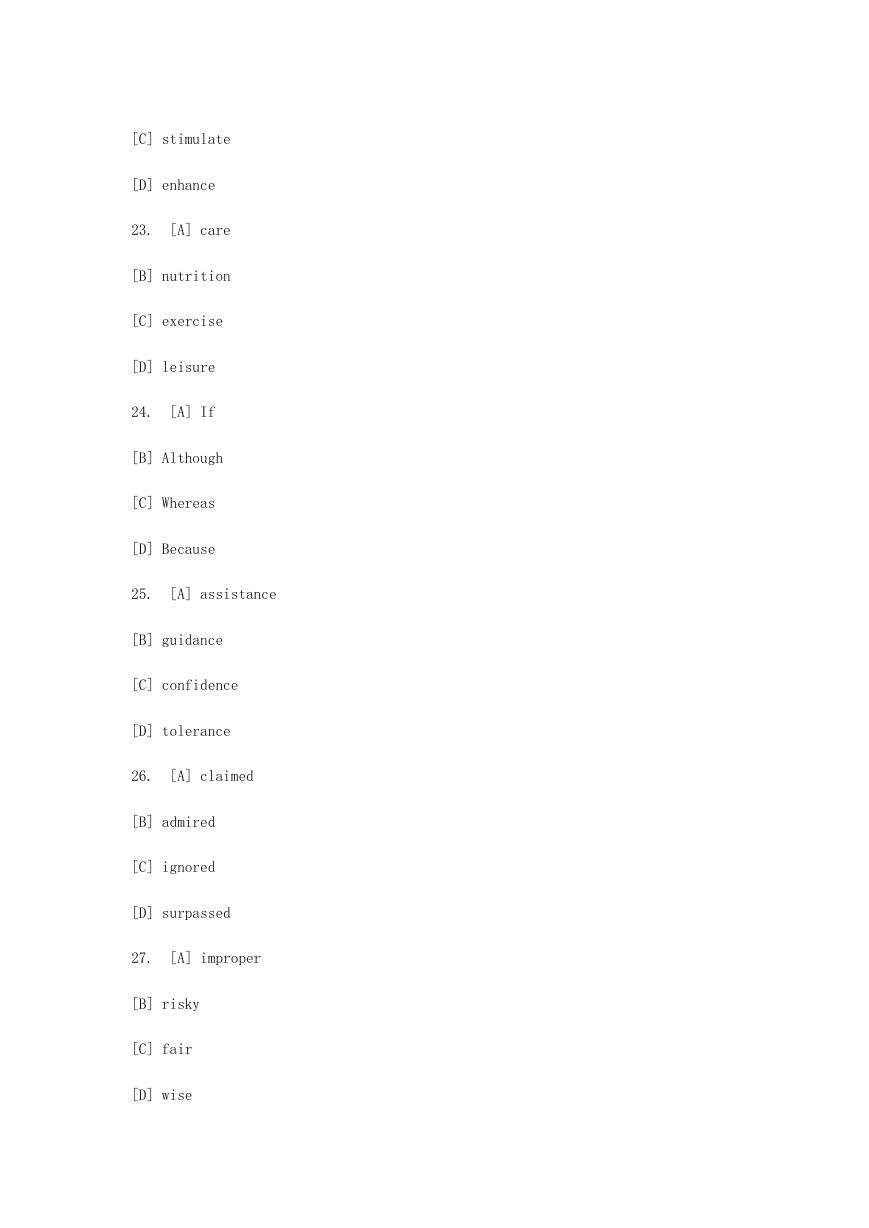
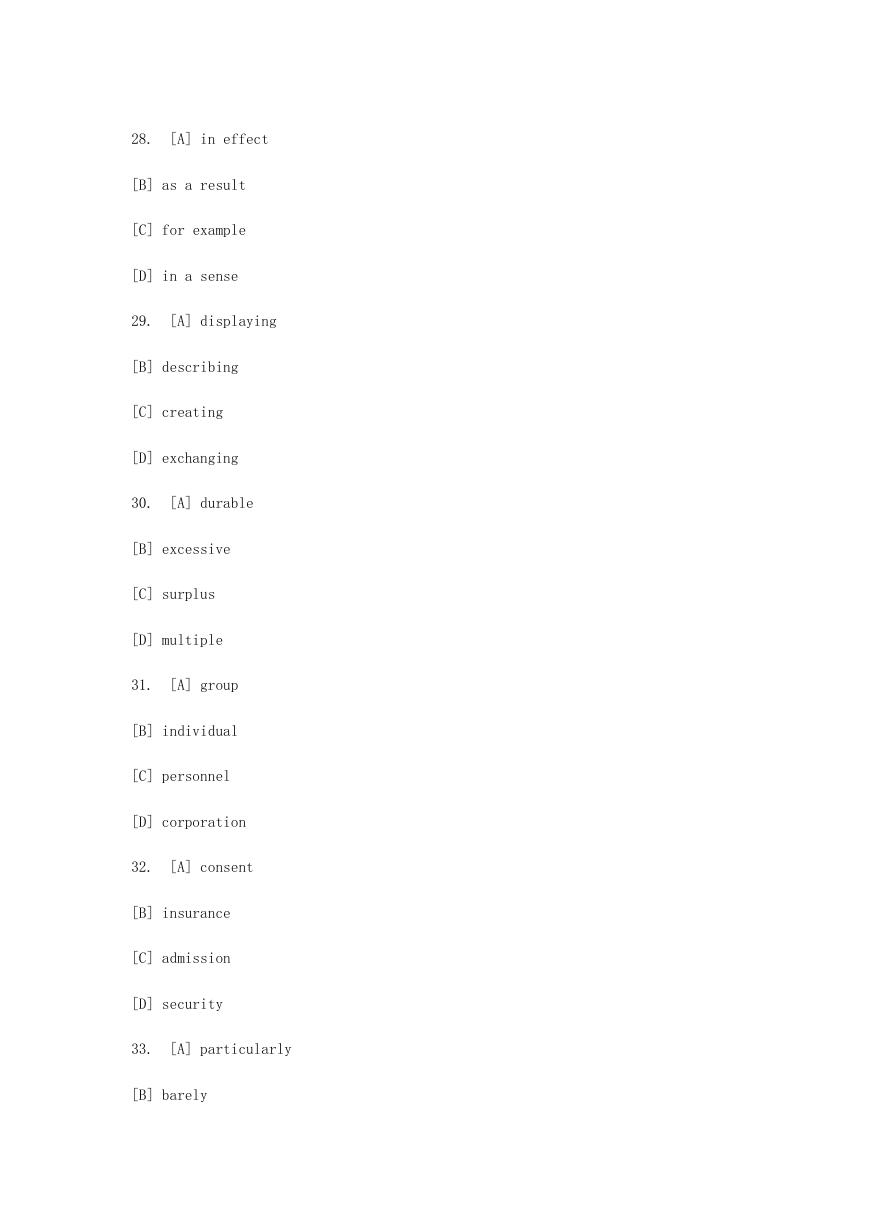
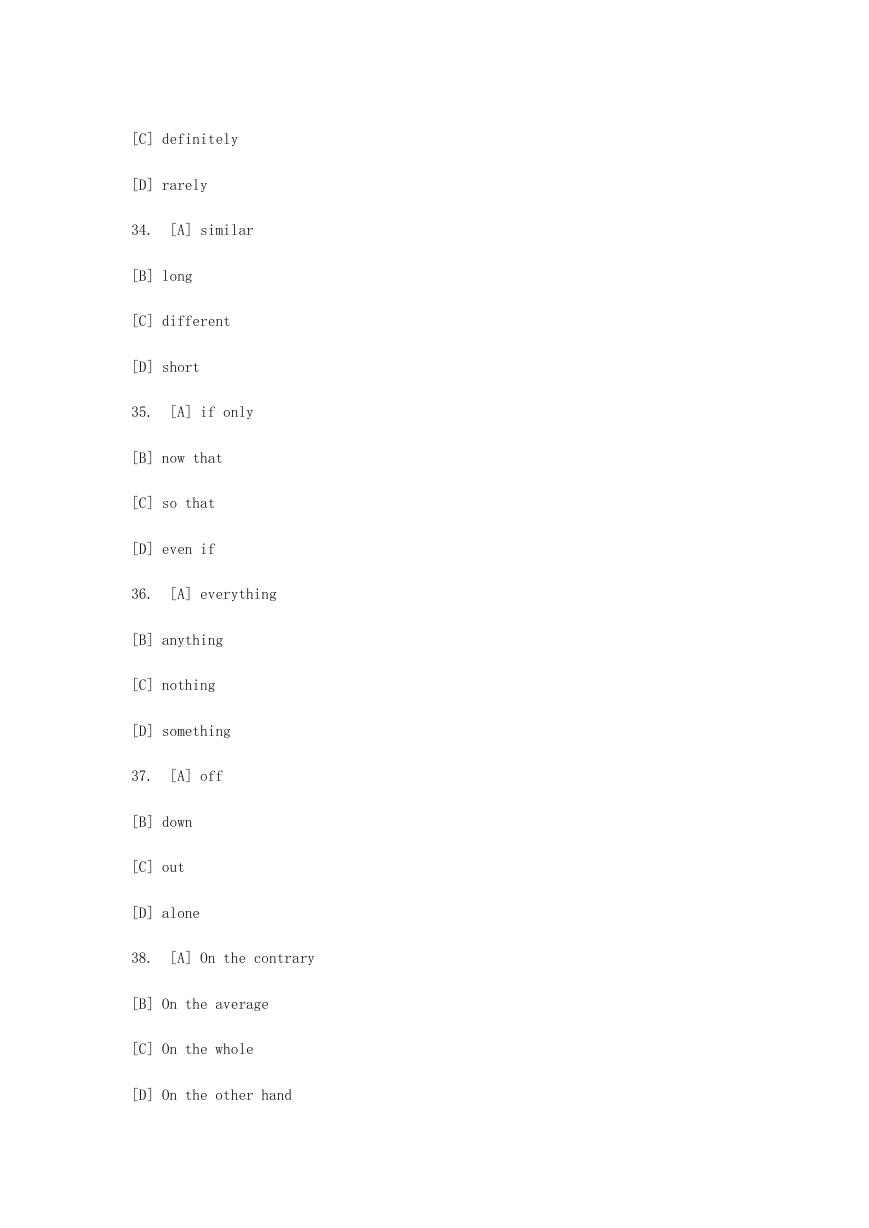
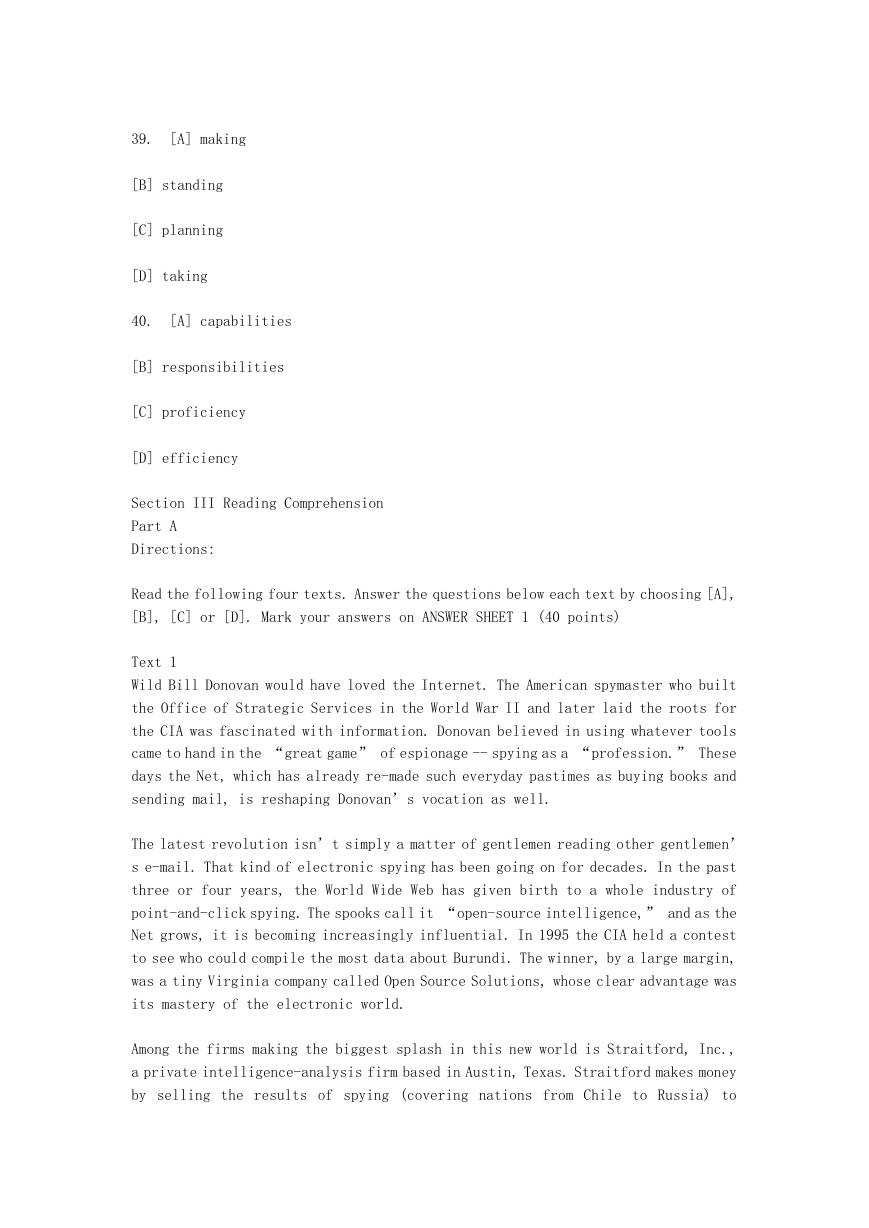
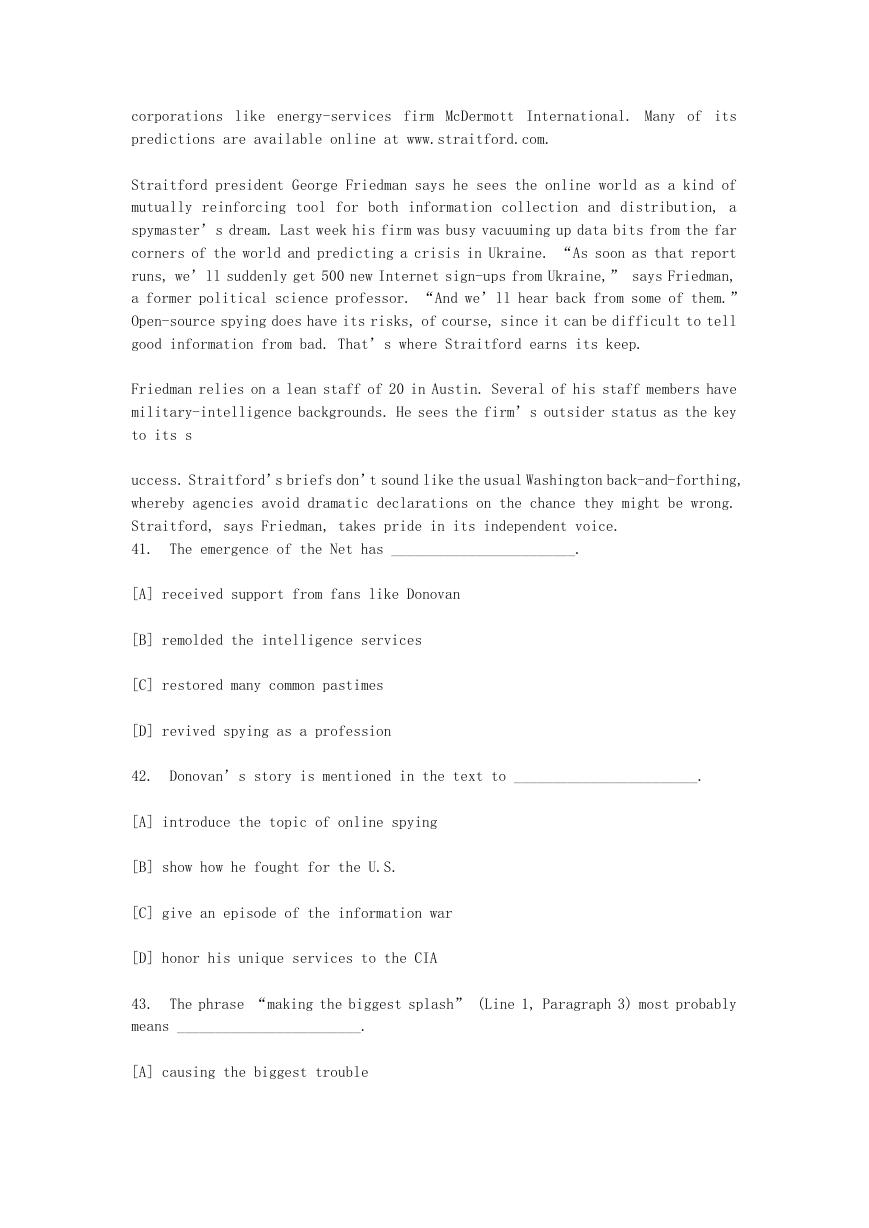
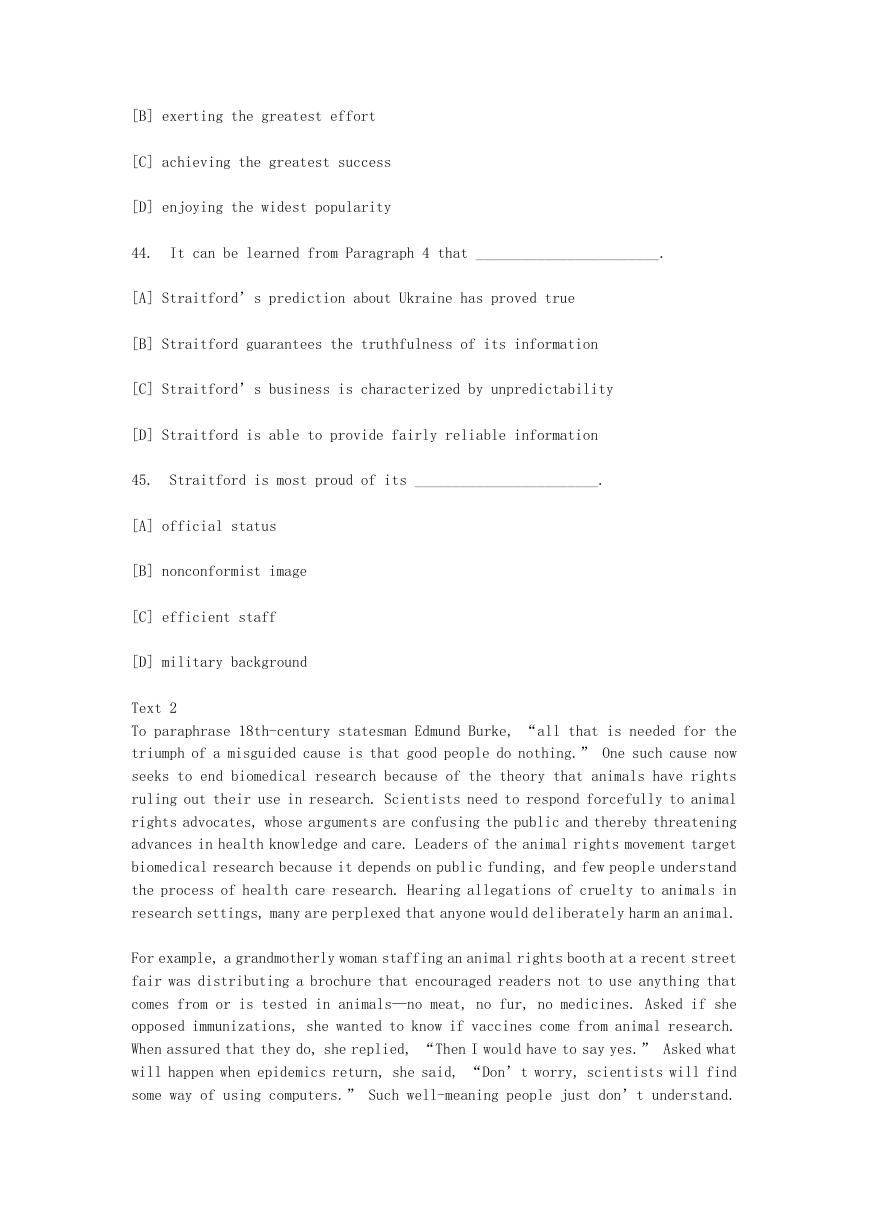









 2023年江西萍乡中考道德与法治真题及答案.doc
2023年江西萍乡中考道德与法治真题及答案.doc 2012年重庆南川中考生物真题及答案.doc
2012年重庆南川中考生物真题及答案.doc 2013年江西师范大学地理学综合及文艺理论基础考研真题.doc
2013年江西师范大学地理学综合及文艺理论基础考研真题.doc 2020年四川甘孜小升初语文真题及答案I卷.doc
2020年四川甘孜小升初语文真题及答案I卷.doc 2020年注册岩土工程师专业基础考试真题及答案.doc
2020年注册岩土工程师专业基础考试真题及答案.doc 2023-2024学年福建省厦门市九年级上学期数学月考试题及答案.doc
2023-2024学年福建省厦门市九年级上学期数学月考试题及答案.doc 2021-2022学年辽宁省沈阳市大东区九年级上学期语文期末试题及答案.doc
2021-2022学年辽宁省沈阳市大东区九年级上学期语文期末试题及答案.doc 2022-2023学年北京东城区初三第一学期物理期末试卷及答案.doc
2022-2023学年北京东城区初三第一学期物理期末试卷及答案.doc 2018上半年江西教师资格初中地理学科知识与教学能力真题及答案.doc
2018上半年江西教师资格初中地理学科知识与教学能力真题及答案.doc 2012年河北国家公务员申论考试真题及答案-省级.doc
2012年河北国家公务员申论考试真题及答案-省级.doc 2020-2021学年江苏省扬州市江都区邵樊片九年级上学期数学第一次质量检测试题及答案.doc
2020-2021学年江苏省扬州市江都区邵樊片九年级上学期数学第一次质量检测试题及答案.doc 2022下半年黑龙江教师资格证中学综合素质真题及答案.doc
2022下半年黑龙江教师资格证中学综合素质真题及答案.doc